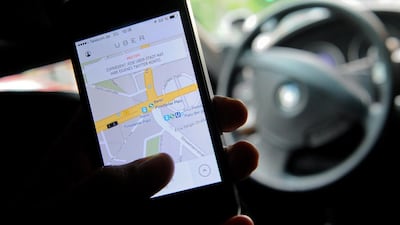In cities all over the world an ugly war is being fought by “traditional” taxi companies against a new form of competition from Uber and other car-sharing services.
These newcomers’ methods aren’t news any more. Through a mobile application customers can find and reserve vehicles in their immediate area in minutes. From Los Angeles to Sydney and Singapore, these services are shaking up the taxi business but are being met with stout resistance.
Historically, taxis have fought for their place in the urban transportation spectrum by staging strikes in attempts to paralyse cities such as London and Paris, leaving hordes of passengers stranded. But the taxi industry’s resistance to the rise of Uber and similar services is a futile attempt to put the brakes on innovation.
Fortune magazine’s lists compiling the 100 biggest companies from 1900 until today yield only one company, Ford, that is still in the same business. Fifteen others still exist but their activities have evolved drastically. All the rest are gone. The ones that have disappeared were leaders in their markets and had three things in common with today’s taxi drivers:
1. The world is changing fast, with new technologies, increasingly expensive and congested transportation systems, and new consumer expectations. This is maybe too fast for the traditional taxi industry, which would prefer more stability. Now it has launched a crusade to defend its interests and prevent reform of an outdated, often monopolistic and over-regulated system.
Traditional taxi drivers are complaining about Uber’s “illegal” activities, saying their drivers don’t have official permits and cannot charge by the kilometre since they don’t have meters. This is a perfect example of industry players being prisoners of an old way of thinking and entrenched in the defence of an ageing system.
2. Long waits, rude drivers, uncomfortable vehicles, and lack of route transparency – the shortcomings of traditional taxis are exactly why the new car-sharing services are prospering. Uber’s founder, Travis Kalanick, 37, has said that the idea for his company was born in Paris when he couldn’t find a cab, an experience that seems all too typical. On the internet, negative comments about taxis abound. “Drivers should be serving customers, not lawmakers,” is one of the usual complaints. Until now, taxi companies seem to be ignoring the simple solutions that customers want. In a recent interview in the Financial Times, a London taxi driver said: “We have been here long before Uber and we will be here long after.” This denial is striking. The battles fought by the taxi companies will mean nothing if in the end they lose the war.
What is worse is that policymakers are supporting taxi companies’ resistance. Germany has just banned the service. In addition, recently a prominent socialist deputy in France, Thomas Thévenoud, submitted a report denouncing Uber’s practices to the prime minister Manuel Valls with proposals on how to solve the car-sharing crisis. These included banning the applications that help users find car-sharing services in their area.
But legislation should protect consumers and not industries in decline.
Following protests by London taxi drivers in June, Uber registered an 850 per cent increase in new users. This is proof that yesterday’s keys to success won’t be the same tomorrow.
3. Uber’s prices are cheaper than those of normal taxis and change according to supply and demand. But that is not why Uber is successful. It is succeeding because it is responding to customers’ needs to offer a unique and innovative experience. While taxi companies are on the defensive, Uber continues to innovate. It recently announced that it will soon offer trips in helicopters – multi-modal transportation Uber- style.
Investors took notice, and the company has an estimated value of US$17 billion after a massive influx of funds in June.
Instead of focusing on how they can respond to their customers’ new needs, taxi companies are coming up with strategies to continue business as usual. Some have recently introduced electronic payment solutions, but let’s hope that is just a first step toward more meaningful change.
Like the taxi companies, many businesses in other sectors are adapting to new challenges too slowly. They don’t see the change around them and think that their success is guaranteed because of their historic position in their industries. It is comfortable and reassuring in the short term, but dangerous in the longer term. If they refuse to innovate, they will quickly fall behind.
Cyril Bouquet is professor of strategy at IMD business school in Lausanne, Switzerland. Chloé Renault is a researcher on innovation and organisational transformation
Follow The National's Business section on Twitter

